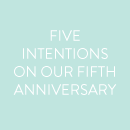18 August 2015
I have never been a baby person. It’s fairly well known among family and friends that I “don’t like babies,” as I mentioned in our announcement post. I’ll never be the one offering to hold your baby, and I don’t even think all babies are that cute. I even had a pact with a dear (baby loving) friend in high school that she would take any of my future babies from ages 0-2 and I would take hers from 14-16.
Rather than a cold, cold heart, I think this stems from a general uncomfortableness with the littlest among us, since I was never much around babies growing up. I did babysit, but only for kids out of diapers! Babies just seemed very fragile, and they can’t use words to tell you what they need (and I like words).
Perhaps because of this, even coming up on our third anniversary, John and I were never on the receiving end of the stereotypical pressure to have kids. I’m sure I probably would have hated it if we had been, but at some point, I actually started to get paranoid – do people think we aren’t fit to be parents?? This obvious (to me) conversational hole was especially ironic, because that very topic was in almost constant rotation between the two of us and our closest friends.
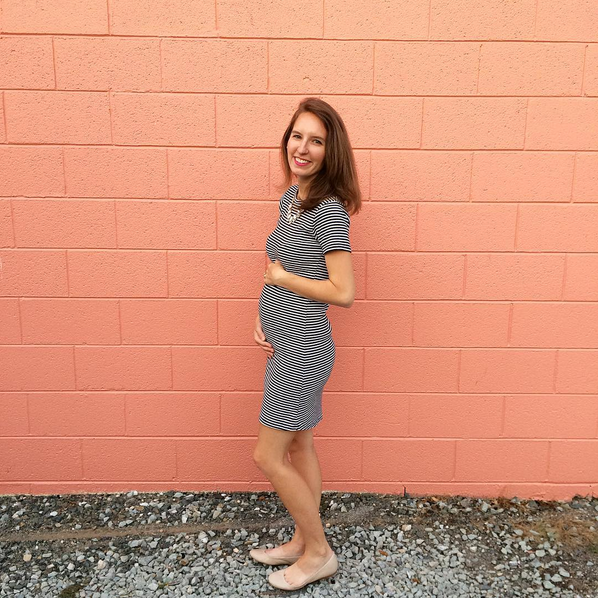
18 weeks!
Thinking back, we began having serious conversations about the future of our family at the beginning of 2014. This was my starting point: I can’t really vocalize why, and I’m certainly not convinced that I’m going to love the baby stage, but when I picture my life, there are treasured children in it. For me, that was enough to move forward. I also knew I wanted to be a younger mom, having my first child before 30.
My hunch is that John started from a similar position, but unlike me, he was not willing to move forward without being able to vocalize a more concrete and rational reason that we should do so. To gather ideas, we embarked on a yearlong quest to answer the question, “Why do people have children?”, hoping to find answers that would resonate with us. We posed this question to each other countless times. We did the same to friends with and without kids, those who knew they wanted them and those who were undecided. We researched online. We read books and blog posts. We listened to sermons and podcasts. We prayed.
The problem is this: all of the “negatives” about having children are very real and concrete: they cost a ton of money. They restrict your freedom. They can derail your financial progress and goals. They complicate your schedule. They complicate your travel. They’re messy. They’re needy. They keep you up at night. They don’t know how to use the bathroom.
On the other hand, the positives are generally intangible, and, almost by definition, unable to be understood or experienced before actually having children of your own.
While an interesting exercise and good conversation fodder, this seemingly unending quest was at times frustrating to me – it seemed like there was no possible answer that would convince John, and all I wanted was to move forward since I believed we were ultimately on the same page and kind of just wasting time. Just recently, though, I read something that really helped me understand why this wasn’t possible for him. It’s from his results from the scarily-accurate, Myers-Briggs based 16 Personalities quiz:
INTJs will strive to remain rational no matter how attractive the end goal may be, and every idea, whether generated internally or soaked in from the outside world, must pass the ruthless and ever-present “Is this going to work?” filter. This mechanism is applied at all times, to all things, and all people.
Apply it we did. We heard many perspectives from many people, and generated several ourselves, as to why people might have children. Ultimately, these were the most convincing to us:
Children will crack open a part of your heart that can’t be opened any other way. Not a new idea, but I would say the way Darren Whitehead in particular described this was extremely moving and heartfelt. I don’t want to miss out on an opportunity to learn about love.
Your relationship with your children will teach you more than anything else can about your relationship with God the father. This totally makes sense to me. I know what being a child is like, but even just being pregnant, I can already tell that experiencing the parent half of the equation will be truly eyeopening. I’m so looking forward to this.
You get to rediscover the world as you teach and walk alongside your child. This is the most obviously fun one! Though the magnitude of shepherding a child is not lost on me, I’m also so excited for all of the people, places, things, and ideas I’ll get to introduce our little one to – and experience anew alongside him or her!
Having children is the greatest expression of hope humans can participate in. We believe the best is yet to come. We are not cynical people. Deciding to have children is tantamount to saying we believe the world they will grow up in will be bright and beautiful, and that’s a statement of faith we want to make.
One more reason on my list: my husband is so precious to me — truly one of the best people I know — that it’s hard for me to even imagine getting to parent someone who was made from him, alongside him. Just thinking about that kind of makes me feel like my heart might explode.
By the end of 2014, we were convinced that children were in our future. However, even armed with that knowledge, we still felt hesitant about jumping in! With our backgrounds, I don’t think either of us would ever have stated that we felt 100% prepared or ready (financially, emotionally, or otherwise) to have a baby. But that’s the beauty of the system – you don’t just decide one day that you’re ready to have a kid, and one arrives on your doorstep the next day.
Once we flipped the switch and actively started trying to get pregnant, it’s kind of crazy how quickly my feelings of hesitation turned to impatience and even anxiety – I wanted to be pregnant immediately! There are so many (really hard and sad) stories of infertility and miscarriage in my circles, and despite the fact that there was no indication in our families or my medical history that either would be a problem, my mind instantly went there. So when we did see PREGNANT show up on the test after just a couple of months, there was relief and joy. No tears :)
We waited a full five weeks to take it, and agreed to look at it together after waiting the obligatory three minutes — but he peeked and saw it first! I know many people find a clever way to share the news with their husbands, but I can’t imagine finding out without John by my side. That didn’t stop us, however, from coming up with creative ways to tell our families and friends – more on that in my next post!
To conclude, one of my biggest fears was that by lingering on The Question for so long, as well as all of the potential negatives of adding a baby to the family, we’d never get out from under them — that even once I was pregnant, John still wouldn’t be excited. However, I needn’t have worried, as that couldn’t be further from our reality now. He is SO excited — probably more excited than me — and clearly already loves this baby so much. (Another gem from 16 Personalities that helps explain this: INTJs trust their rationalism above all else, so when they come to a conclusion, they have no reason to doubt their findings.) People ask us if we’re nervous, and the answer is no – I think we thought through all of our nerves already, and now only joy and peace are left!
Friends, I’d love to hear: have you always felt clearly about having (or not having) children? If you have children or know you want to have them, why? Do any of the conclusions we came to resonate with you?
14 February 2014
A sweet gal emailed me a few weeks ago wanting to know more about my and John’s love story. While I was initially suspicious it was my Mom writing in to make me feel good (ha!), she’s not that devious. Even if not everyone is interested in this long-form version of our story, it’s a good way to record it for posterity! And it’s a good fit for Valentine’s Day :)
John and I grew up in the same small town in Connecticut, but we didn’t meet until middle school, when all of the elementary schools pooled into one school. John was without a doubt one of THE coolest kids in seventh and eighth grade — athletic, handsome, and just shy enough to be mysterious :) I had a crush on him, but sadly, I was just one in the crowd. I can even remember a friend asking me to take her picture while they slow danced at a middle school dance — ahh, the agony! Thankfully, God’s timing is good!
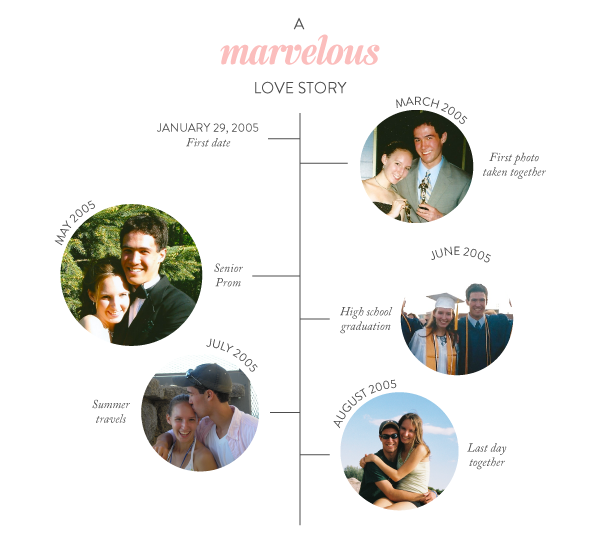
Our respective groups of friends gradually merged senior year of high school. This wasn’t entirely by chance – John had developed a crush on me, and was angling for a way in. He even resorted to loudly talking about how much he liked me while sitting a few seats away from my younger sister in the cafeteria, hoping she would overhear and report back to me. (It didn’t work.)
Finally, in January, he mustered his courage, called me up out of the blue, and blurted out, “So… I think I like you.” To which I responded with nervous giggles, obviously. Nervous giggles to cover the panic. This would be my first date ever (yep), and I was extremely flustered, to say the least. Thankfully, one of my best friends talked me down from the ledge for over an hour, and I agreed to go. (All I can remember saying to her is, “What if I don’t like him??” To which she said, “Then… you don’t go on another date?” Duh.)
It turned out pretty well :) We started with ice skating, then, at John’s suggestion, spent a half an hour slogging through knee-high snow at a local historical site, then finished with an early dinner at a downtown coffee shop. One thing I remember clearly – the whole time we were in his car, we listened to the funniest mixed tape (it included both Barenaked Ladies and the 1812 Overture!). John has gone on to mix me many more memorable CDs over the years.
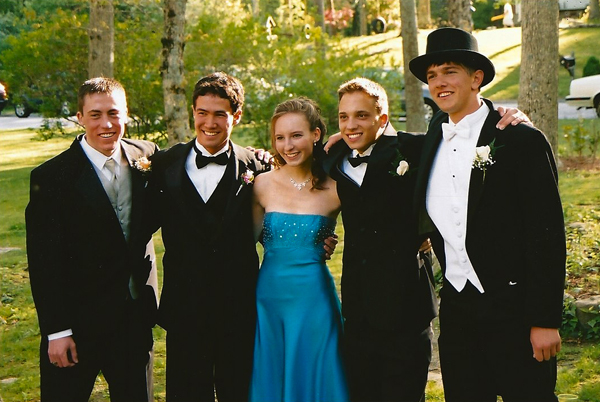
We finished senior year with prom, then headed into the best summer of our lives. I know you’re not supposed to say things like that — the best years are always ahead! — but that particular summer was just golden. We had part time jobs, but we mostly had so much freedom to do all of our favorite things with some of our favorite people. We went to the beach and swam at the lake, watched movies in the hammock, played board games and badminton, met for breakfast and lunch and picnic dinners, and hung out with each other’s families. We took trips to Cape Cod, Maine, and Block Island.
The day of our departure for college finally arrived, the worst possible ending to the best possible summer. We had started dating long after college application deadlines, and were headed to different schools in different states — he in Washington, DC, me in Massachusetts.
Every way I try to describe our last night sounds ridiculously dramatic, and yet, nothing encompasses the wrenching pain we felt. When he finally shut my house’s front door around 2:30am (far later than we should have been up, but our parents were kind enough not to intervene), I sunk to the floor and wailed. Tears leaked out of my eyes in a near-constant stream throughout the next few days as I packed and moved into my dorm.
I suspect transitioning to college life would have been difficult for me under optimal circumstances (remember this post? I don’t do well with change), but these were certainly not optimal circumstances. Thankfully, we were able to see each other about once a month that first semester – once when John came home for an emergency wisdom tooth extraction (a blessing in disguise!), twice when I visited DC, and once each for Thanksgiving and Christmas. In between, we talked on the phone multiple times a day, and instant messaged almost constantly (yes, people were still IM-ing back then!).
We immediately began brainstorming ways to change our situation. For a variety of reasons, it became clear that the best option was for John to transfer to my school, and in the spring, we found out he had been accepted for our sophomore year! Though we were both elated, it was a bit of a stressful decision – being so miserable, I wasn’t even sure I liked the school I was at, and yet John was making an enormous effort to join me there. Transferring also meant he would lose an impressive merit scholarship. I’m sure some people thought we were crazy — we had been dating for less than a year — but we knew this was it for us. We became each other’s future quickly and seamlessly.
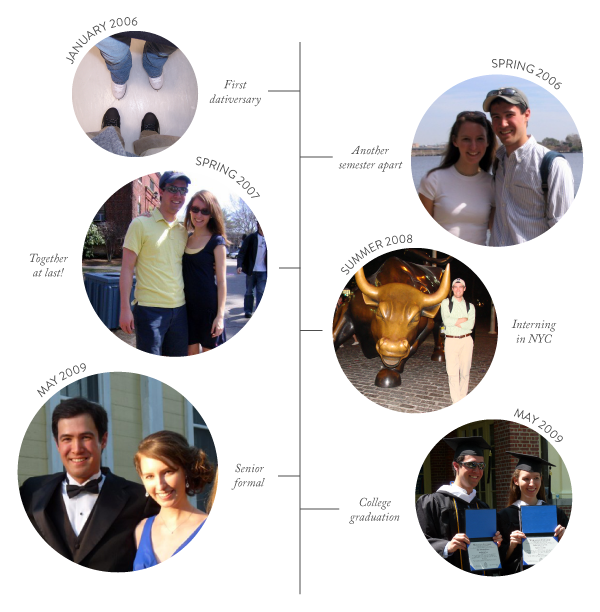
Life began looking up once we were together, and the rest of our college career was filled with some amazing memories. We both interned in New York City the summer before our senior year, and my experience there prompted me to start this blog!
As graduation approached, we agreed that we would both search for opportunities, and follow the first person to be hired. I ended up receiving an offer in July, and John again made a huge leap to accompany me to North Carolina (more about that here). Many of our adventures since then have been chronicled on Em for Marvelous, including our engagement, wedding, honeymoon, and, most recently, house purchase.
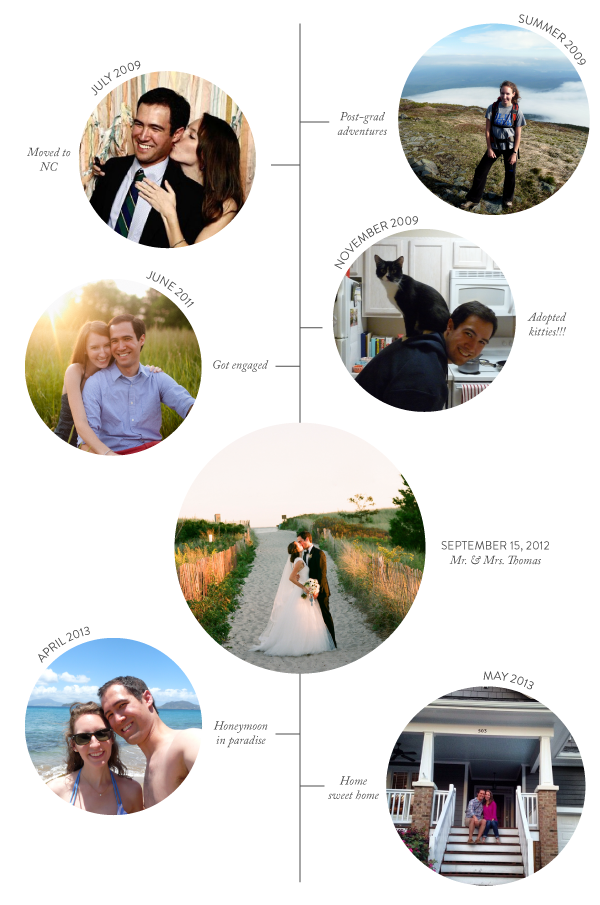
I’m not sure if I’m qualified to give marriage advice, seeing as we’ve only just passed our first anniversary, but perhaps I can offer some relationship advice — we have been together for almost ten years, after all. There are a lot of things I could tell you about what works for us, but I think one of the strongest things about our relationship is that we trust in it without reservation. We’ve never given each other a reason to doubt it, and so we’ve never been tempted to do so. We don’t treat our love for each other like it’s conditional, or could be threatened to be taken away, or withheld as a bargaining chip. Even if we are angry or frustrated, at bedrock, we both have always known without a doubt that we are acting from a place of unshakeable love.
And that, my friends, is our marvelous love story. Happy Valentine’s Day!
27 January 2014
I don’t think I’ve written about it much (ever?) here, but when I first moved to North Carolina, I was miserable. Actually, just to make you feel better about yourself if you’re currently suffering from a severe case of homesickness, let me be clear: every day when I came home from work, I would cry through dinner. For a month. The only thing I wanted to discuss on our evening walks was our plan for moving back to Connecticut — how, and how quickly it could happen. I hated NC and the town we lived in, I missed my family and my friends horribly, I found starting a new job ridiculously stressful, I couldn’t stand the July heat… the list goes on.
A lovely reader emailed me last fall to ask if I could write a post about how I got over my homesickness. I feel badly that it’s taken me so long to do so, but the truth is that even now, after almost five years, the memory is still a bit raw. Thankfully, it has much, much softer edges, and I hope this post might be an encouragement to any of you who are going through something similar. My best tips for curing homesickness, accompanied by pictures of our cats, because everything is better with cats:
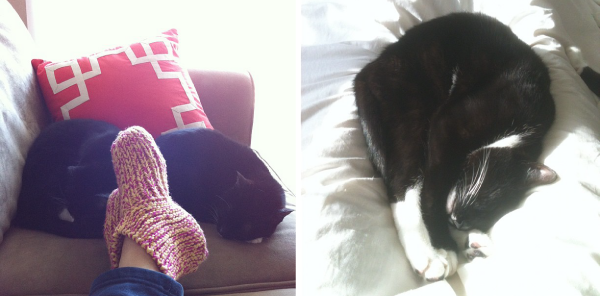
1. Have a support system. I almost feel bad for writing this one, because if I hadn’t had John by my side, I don’t think any of these other tips would have done the trick. But, it needs to be said. Keeping in mind that it was MY job opportunity we had uprooted and moved for, it’s nearly unbelievable to me how kindly and stoic-ly he tolerated my complaining and wailing, commiserating without joining in on my NC-bashing fests. He fed me dinner every night (even if I cried through it), and never once made me feel guilty about my opportunity even though he was dealing with his own homesickness. He was, and is, my hero. Maybe it’s not your boyfriend — it could be your Mom or Dad or your best friend. But please, find a patient soul who will love you and listen to you, for as long as it takes.

2. Get your internet hooked up ASAP. A practical tip! Make arrangements for your internet to be hooked up the day you move in, if possible. Though in reality it was a week at most, it seemingly took eons for our internet connection to get hooked up after we moved in. In those extremely fragile first few days, it was almost more than my stressed-to-the-limit heart could take to have to go to the library to use the internet (we didn’t have smart phones back then). Why did I need to use the internet? Aside from simple things like looking up how to get places, the internet was the easiest way to connect with faraway loved ones. My family started a private blog the week before our move, and chronicling our first days and weeks in a new place was a great way for me to vent. It also was more efficient than calling four family members every night to give four separate rundowns on my sorry state. When you’re spending a lot of time crying, you need to be efficient in other areas of your life :)
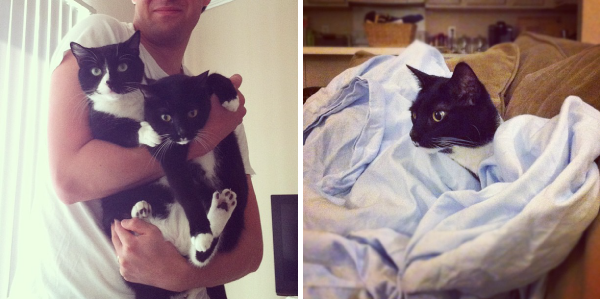
3. Find a church. It took us a few weeks, but finding a church we loved was the first tiny step toward feeling like we belonged in NC. We still attend the first church we tried, so our search was easier than most, but even though we didn’t know anyone at church, feeling like we had somewhere to go every week, somewhere down here that we identified with and felt a part of, was a huge turning point for us.
4. Concentrate on the good parts. Easier said than done, my friends. And it took me a long time to take my own advice. I was so busy hating our new town for everything it wasn’t (charming, historic, familiar, near the water, moderately temperatured) that I had no time to appreciate it for what it was (new, filled with stores I used to have to drive an hour to, close to the airport, surrounded by amazing city centers). It’s not that I’ve lost my love for New England, just that, over time, I’ve grown to appreciate the GOOD things about where we live.
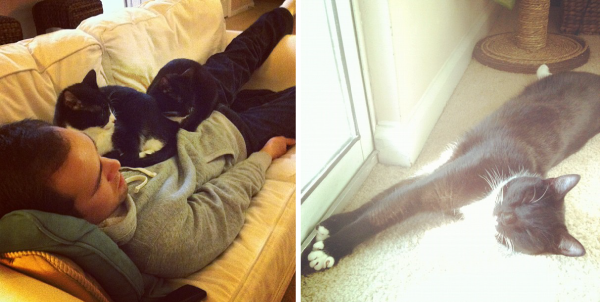
5. Get out there. Of course, until I started experiencing those good things, it was hard to appreciate them. Despite our depressed state, we made everyday adventures a priority, discovering more and more things to love about NC along the way. Use the tips in this post if you need help — getting out of your house/apartment and doing something fun instead of moping/sulking is key.
6. Get a pet. I’m serious. Until we got our cats, going back to NC after a visit to our families was nothing but misery — but once we had two little fur friends waiting for us, “home” started to feel a little more like home.
To return to the title of this post, in my experience, the only real “cure” for homesickness is time. Hopefully, the rest of these suggestions will make the wait a bit easier. One other thought that might help? Homesickness only exists because the people and places you’re leaving behind are so well-loved. Reminding myself of this didn’t always work, but it’s worth a try :)
I would love to hear: Have you ever up and moved somewhere completely new? Have you ever experienced intense homesickness? If so, what helped you cure it?
P.S. I don’t have anything about friends on here because making friends was an entirely separate issue for us than curing homesickness. If you can believe it, it took us even longer :) Perpetually jealous of those, like my younger sister, who make friends at the drop of a hat!
6 January 2014
I mentioned in my 2013 recap post that we had recently ticked off the major financial goal of paying off my student loans. HOORAY! I received a few emails asking questions about how we did this, so I thought it would be a perfect topic for our first Marvelous Money post of the new year!
Let me make the requisite disclaimer here that this is simply me sharing my experience. I’m also assuming that you’re starting from a place of paying all of your bills on time. Debt can be complicated and scary, so if you’re in over your head, I would highly recommend seeking the advice of a financial professional.
I wanted to start by briefly addressing why paying off debt is a worthy goal. With it being the New Year, a lot of people are talking about this right now (which is awesome!), but if paying off debt is just something that sounds good, it’s easy to lose heart when you’re slogging through the often long and tedious process. There’s power in understanding the why. Remember that aside from reducing the amount you’ll spend in interest over your lifetime, the real goal of paying off debt is to move one step closer to financial freedom — and when you’re financially free, you have more independence, more security, and more options in almost every part of your life.
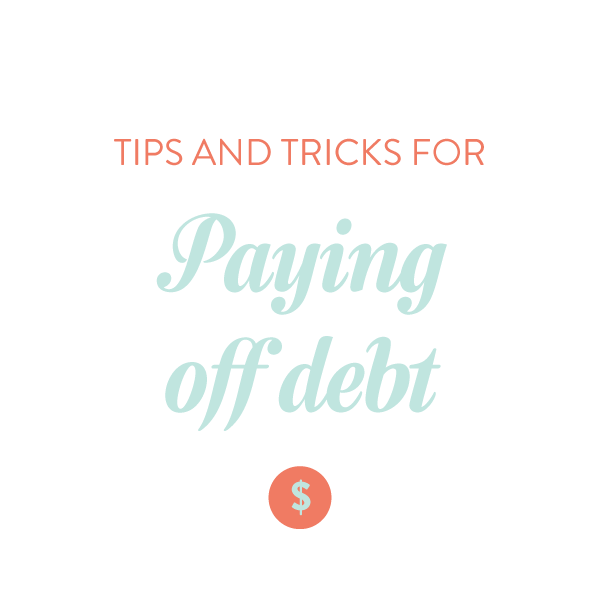
Let’s begin! I’m going to start with a little background on our situation, and then share a few techniques we’ve used over the last four years. From the beginning of 2010 (shortly after we graduated) we’ve had five financial goals. We tackled them roughly in this order, though all have been ongoing:
1. Fully funding our emergency fund
2. Fully funding our wedding contribution
3. Fully funding a house down payment
4. Paying off my student loans (3)
5. Paying off our car loans (2)
We’ve never had credit card debt. Our focus (and dollars) have shifted over time, but here’s a rough breakdown from year to year:
2010: Extra money went toward wedding and emergency funds (minimum payments on students loans, no car payments).
2011: Extra money went toward wedding and emergency funds (minimum payments on student loans and minimum payment on car loan number one, added halfway through the year). In the last two months we doubled the car payment.
2012: Completed wedding and emergency funds and transferred that monthly amount to a down payment fund. Added a new car payment but did not increase the total amount spent on cars by cutting back car payment number one to minimum (see 2011). Increased one of three student loan payments and paid off that loan by the end of the year.
2013: Completed down payment and transferred that monthly amount to student loans. Increased student loan amount again later in the year to pay both off.
2014: Transferred entire amount to car loans, which will both be paid off by May.

Aside from sticking to a budget, here are a few of the techniques we used:
Schedule payments in advance.
Sign up online for a monthly auto-debit for each of your accounts so that you’re never late with or forget a payment. Make it automatic – you won’t miss it as much as you think.
Feel the pinch.
Every time our budget expanded, we chose to allocate the extra dollars toward debt reduction. Raise at work? Going toward debt. Bonus? Going toward debt. EFM profits? Going toward debt. Sometimes in the last few years we looked at each other and were like, why do we feel poor?? But then we reminded ourselves that we were living at a lower standard of living by CHOICE. If you’re paying off debt and are not feeling the pinch in your lifestyle, you almost certainly have room to cut back and increase your payments.
Pay more than the minimum amount.
If you’re feeling the pinch you are likely already doing this, but it’s worth stating again: pay more than the regular monthly amount. Annoyingly, banks will often make this difficult to do (you might have to talk to a representative or mail in a form instead of doing it online), but persevere! After all, they don’t want you to stop paying them interest :) At times, we were paying more than twelve times the required monthly payment on certain debts using the debt snowball. Which leads us to…
Roll the snowball.
The debt snowball is simple, but it is by far the most important technique we used to pay off our debt early. The basic idea is to pay the minimum amount on all of your debts except one and then throw all of your other available resources at that one. Once that debt is paid, immediately move the payment for that debt toward another and so on until all of the debts are paid. You can follow the general outline of how we did this above. Dave Ramsey suggests starting with the debt with the smallest dollar amount and moving toward the largest dollar amount; other experts recommend starting with the debt with the highest interest rate and moving toward the lowest interest rate or considering the taxability. We used a combination of these strategies. As long as you’re working aggressively toward your goal, I don’t think you can go wrong.
Track your progress.
I kept a Google Doc spreadsheet that listed our debts, the current amount we paid per month on each, the outstanding total of each, and the month the last full payment was scheduled. Every time a payment processed, I’d go in and update the spreadsheet. It was extremely motivating to see everything shrink over time!
Two final thoughts:
1. Work with urgency, BUT.
I am all for paying down debt aggressively. However, as in almost every other area of my life, I believe that a dose of moderation is healthy. Throughout this process John and I have made decisions that not all experts would agree with, but that we are comfortable with because they were thoughtfully made. For example, we chose to save for our wedding instead of putting that extra money toward a debt payment. We also have taken several trips together over the last few years, money which could have gone toward paying a debt.
I hesitate to even include this because I don’t want it taken out of context or for anyone to think that you can be jetting to exotic locations every month (or even every year!) and still be making aggressive progress on your debt, but y’all are sophisticated people. Balancing on one hand the idea of “living like no one else so you can live like no one else” and on the other, the reality that life is uncertain and your days are not guaranteed, is difficult, but very necessary.
2. Think about what’s next — tell your money where to go.
As we approach the end of our debt snowball, we’ve been thinking about how we want to allocate that money once it’s available. We are still deciding, but we’re currently planning to use some of it to begin building up a car fund so that our next car purchase (hopefully a few years from now) will be in cash.
Once you find yourself in this position, by all means, go ahead and use some of that money for something fun! (And feel free to dream about it beforehand as motivation!) But remember you also have a great opportunity at this juncture, and the potential to build a firm foundation for your financial future — one where you speak about debt only in the past tense. You’ve already conditioned yourself (probably for several years) to live without a considerable amount of your take-home pay, and so instead of increasing your consumption, why not put some of it toward other financial goals? (Might I suggest retirement or an emergency fund?) The best part? This time, instead of paying interest, you’ll be gaining interest. And that, my friends, is pretty marvelous.
I would love to hear: Is paying off debt something you’re working toward? Where are you in the process? Are you using the debt snowball?
P.S. Want some more encouragement? My friend Nancy and her husband Will have an amazing story of paying off their house in 32 months. Read it in five parts: 1, 2, 3, 4, 5.























